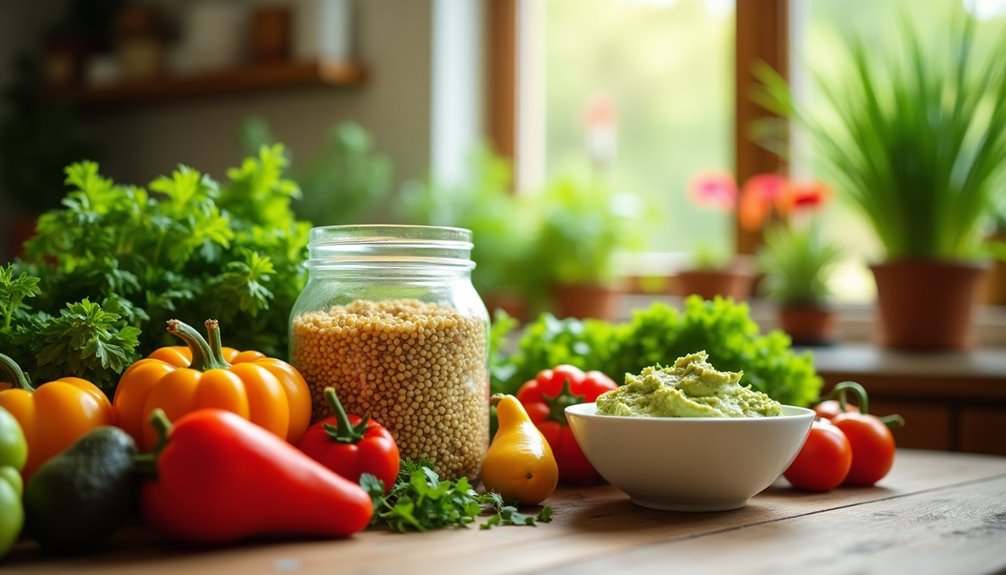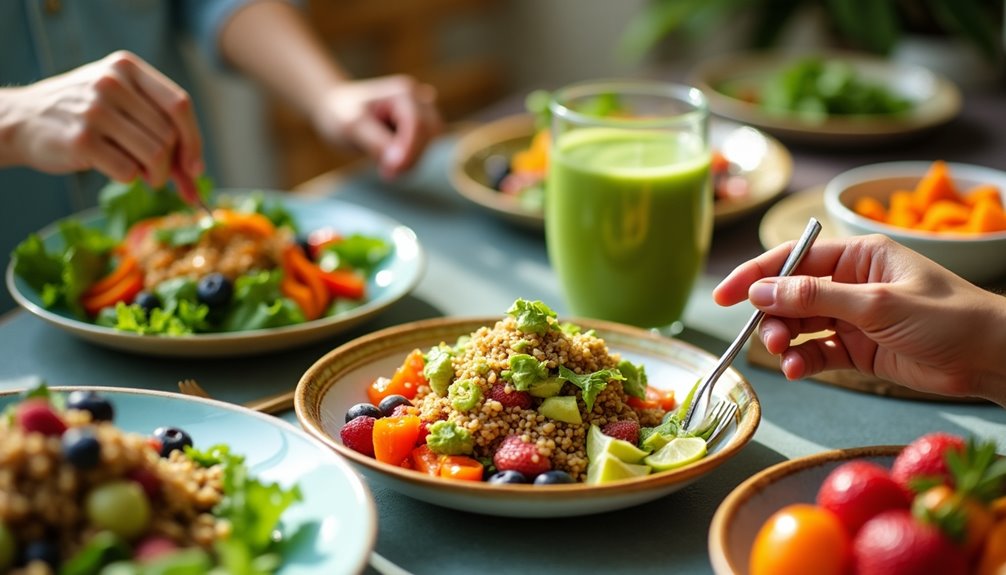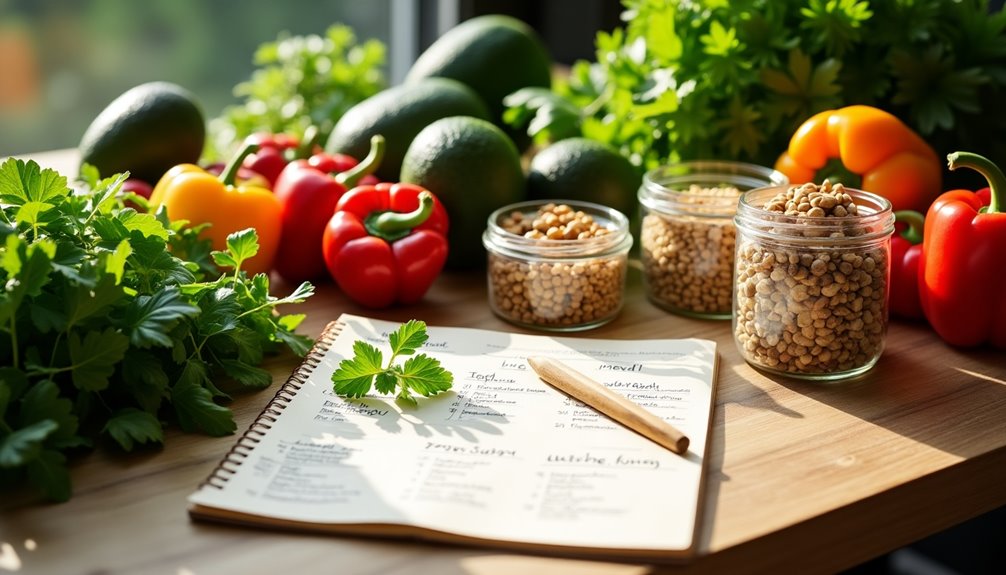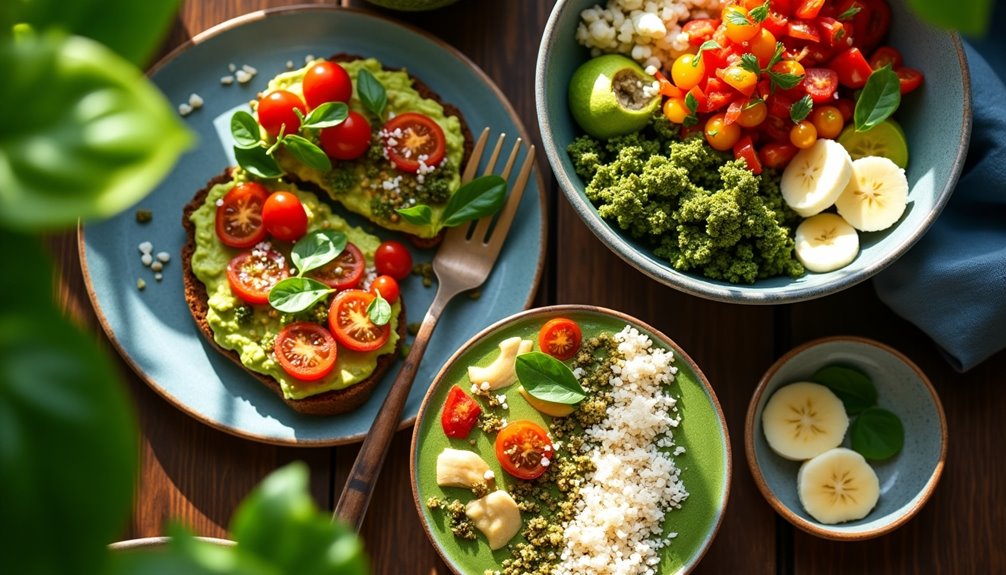A flexible plant-based diet focuses on fruits, vegetables, whole grains, nuts, and seeds while allowing you to customize your meals to fit your tastes and lifestyle. This approach promotes health benefits like lower cholesterol, reduced chronic disease risk, and enhanced overall well-being. Its flexibility makes it enjoyable and sustainable, letting you experiment with diverse ingredients and cuisines. Planning balanced meals, exploring new recipes, and connecting with supportive communities can help ease the changeover. You'll discover that this adaptability not only enriches your diet but can also make the journey more fulfilling and exciting. There's much more to explore about this lifestyle!
Key Takeaways
- A flexible plant-based diet allows for personalization, accommodating individual preferences and dietary restrictions while promoting overall health.
- Incorporating a variety of whole foods, including fruits, vegetables, and grains, enhances the diet's nutritional value and enjoyment.
- Meal planning strategies, such as batch cooking and exploring diverse ingredients, make maintaining a plant-based lifestyle easier and more sustainable.
- Using herbs and spices can elevate flavors in plant-based dishes, encouraging experimentation and creativity in cooking.
- Building a supportive community through local groups or online forums fosters motivation and shared experiences in the plant-based journey.
Understanding Plant-Based Diets

A plant-centered diet primarily focuses on foods derived from plants, including fruits, vegetables, whole grains, nuts, and seeds, while minimizing or eliminating animal products. This dietary approach can offer numerous health benefits, such as reduced risks of chronic diseases like heart disease, diabetes, and certain cancers. By choosing plant-centered foods, you're likely to increase your intake of essential nutrients, fiber, and antioxidants, all of which contribute to overall health and well-being. Additionally, adopting a plant-based diet can help lower cholesterol levels and enhance heart health.
However, it's crucial to recognize the importance of balancing your diet, especially if you have specific dietary restrictions. For instance, if you're allergic to nuts or gluten, you'll need to find alternative sources of nutrition that still align with a plant-centered lifestyle. Many people appreciate how these diets can be adapted to fit their individual needs, making it easier to enjoy a sense of belonging within the plant-centered community.
While shifting to a plant-centered diet, you might encounter challenges like social situations or cravings for familiar foods. Acknowledging these struggles is essential as it helps you stay motivated and connected with others who share similar experiences. By focusing on the health benefits and being mindful of your dietary restrictions, you can create a sustainable eating plan that supports your health goals and fosters a sense of community. Embracing this lifestyle doesn't just promote personal health; it can also inspire those around you to explore the many possibilities within plant-centered eating.
Benefits of a Flexible Approach

Flexibility in adopting a plant-based diet can greatly enhance your overall experience and success. By allowing yourself to be adaptable, you can enjoy numerous health benefits while embracing dietary variety. This approach makes it easier to include a wide range of foods, making sure you get essential nutrients without feeling restricted.
Here's a simple breakdown of the benefits of a flexible approach:
| Benefit | Description |
|---|---|
| Health Benefits | A plant-based diet can lower the risk of chronic diseases, improve heart health, and support weight management. Flexibility allows you to find what works best for your body. |
| Dietary Variety | You're encouraged to explore various fruits, vegetables, grains, and legumes. This diversity not only keeps meals exciting but also guarantees a broader nutrient intake. |
| Sustainability | By being flexible, you can adapt your diet to local availability and seasons, promoting environmental sustainability. |
| Social Inclusion | You can participate in social gatherings without feeling alienated, making it easier to enjoy meals with friends and family. |
| Personalization | Flexibility allows you to tailor your diet according to personal preferences and lifestyle, making it more enjoyable and sustainable. |
Incorporating whole food sources of protein into your meals can further enhance your energy levels and support your health goals.
Key Components of Flexibility

Embracing a flexible plant-based diet involves understanding its key components that make it practical and enjoyable. One of the most significant aspects is flexibility. You can adjust your meals based on your preferences, dietary needs, and lifestyle. This means you're not restricted to a strict set of rules; instead, you can explore a range of foods that resonate with you.
Customizable options play a crucial role in this flexibility. Whether you're in the mood for a hearty salad, a comforting soup, or a delicious stir-fry, you can tailor your meals to fit your taste. This level of personalization ensures that you're not only nourishing your body but also satisfying your cravings. You have the freedom to swap ingredients, making it easy to incorporate what you love and avoid what you don't.
Variety is another key component. A flexible plant-based diet encourages you to embrace different fruits, vegetables, grains, and legumes. This diversity not only keeps your meals exciting but also provides a wide array of nutrients, supporting your overall health. By experimenting with various cuisines, you can discover new flavors and textures, enhancing your culinary experience. Additionally, adopting a flexible plant-based diet can significantly contribute to reducing your greenhouse gas emissions, making it an impactful choice for the environment.
Meal Planning Tips

When you plan your meals ahead of time, you set yourself up for success in maintaining a flexible plant-based diet. Meal planning not only saves you time during the week but also guarantees you're eating balanced meals that provide essential nutrients. Start by choosing a variety of whole foods, including fruits, vegetables, grains, legumes, nuts, and seeds. This diversity helps you meet your nutritional needs while keeping your meals exciting.
One effective strategy is to create a rotating meal plan. Pick a few go-to recipes for breakfast, lunch, and dinner, then repeat them throughout the week. This simplifies shopping and cooking while allowing room for recipe swaps. If a recipe calls for a specific vegetable or grain you don't have, don't hesitate to substitute it with something else in your pantry.
For instance, if a recipe suggests quinoa, you can easily exchange it for brown rice or farro. These small adjustments help you maintain flexibility without sacrificing flavor or nutrition.
Additionally, consider batch cooking. Preparing larger portions of your favorite meals can save time and guarantee you always have healthy options on hand. When you're busy or feeling uninspired, having ready-to-eat balanced meals simplifies your choices and keeps you aligned with your dietary goals. Remember, meal planning is about finding what works best for you while fostering a sense of community with others who share similar dietary values. To enhance your meal planning, consider exploring online support community resources where you can share ideas and gain inspiration from others on their dietary journeys.
Delicious Plant-Based Recipes

Finding delicious plant-based recipes can transform your meals and make your dietary journey enjoyable. You don't have to sacrifice flavor or satisfaction when you embrace a plant-based diet. Instead, think of it as an opportunity for creative cooking, where you can explore diverse ingredients and flavors that elevate your dishes.
Start with flavorful substitutions for common ingredients. For instance, swap dairy milk with almond or oat milk, which can add a nutty twist to your smoothies and baked goods. Instead of butter, try using coconut oil or avocado for a creamy texture in your recipes. These simple changes can make a big difference in taste while keeping your meals plant-based.
There's a wealth of recipes available that are both nutritious and delicious. Consider trying a chickpea curry packed with spices, or a hearty lentil soup that warms you up on chilly days.
You can also experiment with whole grains like quinoa or farro, which serve as excellent bases for salads or bowls. Incorporating a variety of delicious Keto recipes can also inspire your plant-based cooking by showing you how to create flavorful, satisfying meals.
Don't forget the power of herbs and spices! They can transform basic ingredients into something extraordinary. A sprinkle of fresh basil or a dash of smoked paprika can elevate your dishes to new heights.
Overcoming Common Challenges

Shifting to a plant-based diet can bring up a variety of challenges that you mightn't have anticipated. One of the most common obstacles is facing social events. Whether it's a family gathering or a night out with friends, you may find it difficult to find suitable options. You don't have to feel isolated, though. Here are a few tips to help you overcome these challenges:
- Communicate Your Needs: Don't hesitate to let your friends or family know about your dietary preferences. Most people appreciate the heads-up and may even prepare something plant-based for you.
- Plan Ahead: If you're attending a social gathering, consider bringing a dish you love. This way, you'll make sure there's something you can enjoy, and you might even inspire others to try it!
- Explore Local Options: When you're out with friends, research restaurants that offer plant-based choices. Many establishments now cater to diverse diets, making it easier to find something satisfying.
Additionally, traveling restrictions can pose a challenge. You might worry about finding plant-based meals while on the go. To address this, pack snacks like nuts, fruits, or energy bars to keep you fueled. Check for local grocery stores or markets at your destination to stock up on fruits and vegetables. Implementing age-old strategies can also ease the transition to a plant-based diet and help maintain a healthy lifestyle.
Transitioning to a Plant-Based Lifestyle

Switching to a plant-based lifestyle often feels challenging, but it can be a rewarding journey toward better health and environmental sustainability. To make this shift smoother, you can start by gradually incorporating more plant-based meals into your diet. Begin with one or two meatless days a week and slowly increase the frequency as you become comfortable.
One effective tip is to explore a variety of plant-based recipes that excite your taste buds. Resources like cookbooks, blogs, and meal prep apps can provide inspiration and ease the cooking process. You don't have to reinvent the wheel; many familiar dishes can be adapted by swapping animal products for plant-based alternatives.
Don't forget to educate yourself about nutrition. Understanding how to balance your meals with the right combinations of protein, healthy fats, and carbohydrates is essential. Websites and online communities offer valuable insights into how to maintain a nutrient-rich diet while being mindful of your food choices. Additionally, research has shown that following a balanced diet can significantly improve overall health and help manage conditions like diabetes.
In addition, connecting with others who share similar goals can provide motivation and support. Join local groups or online forums where you can exchange tips, share experiences, and celebrate your progress together. Remember, it's okay to take your time and make adjustments that suit your lifestyle. Making changes doesn't have to be all or nothing; every small step contributes to a healthier you and a healthier planet. Embrace the journey, and you'll find your place in this vibrant community.
Frequently Asked Questions
Can I Have Occasional Meat on a Plant-Based Diet?
Absolutely, you can enjoy occasional meat while focusing on a plant-based diet. It's all about balance! Incorporating meat alternatives like tofu, tempeh, or legumes can help create nutritious, balanced meals. By allowing flexibility, you can satisfy cravings without compromising your goals. Just remember to prioritize whole foods and a variety of nutrients, ensuring your diet remains diverse and fulfilling. Enjoy the journey, and embrace what works best for you!
What Are Some Common Misconceptions About Plant-Based Diets?
Did you know that nearly 70% of people believe a plant-based diet lacks nutritional balance? This misconception can lead to unnecessary fears about health. In reality, a well-planned plant-based diet can provide all essential nutrients.
Another common myth is that these diets don't positively impact the environment. In truth, reducing meat consumption greatly lowers carbon footprints.
Embracing plant-based foods can be both nutritious and eco-friendly, allowing you to thrive while making a difference.
How Does a Flexible Approach Affect Nutrient Intake?
A adaptable approach to your diet can greatly enhance your nutrient balance. By incorporating a variety of foods, you make sure that you're getting essential vitamins and minerals. This dietary variety not only keeps meals interesting but also supports overall health.
You can easily adapt to your personal preferences while still prioritizing nutrient intake, making it simpler to meet your body's needs. Embracing flexibility helps you feel more connected to your food choices and community.
Is a Flexible Plant-Based Diet Suitable for Children?
You might think a flexible diet isn't kid-friendly, but it can actually be a treasure trove of nutritional possibilities! With kid-friendly recipes and creativity, you can guarantee your children get essential nutrients while enjoying their meals.
What Should I Do if I Crave Non-Plant-Based Foods?
When you're craving non-plant-based foods, try some craving strategies to address those feelings.
First, identify what you're craving and seek alternative indulgences that satisfy the same taste or texture. For instance, if you want something cheesy, try nutritional yeast on popcorn.
Also, stay hydrated and consider healthy snacks like nuts or fruits to curb the urge.
Conclusion
Embracing a flexible plant-based diet is like tending to a garden; it thrives with care and variety. By integrating more plant foods into your meals while allowing room for occasional indulgences, you cultivate a sustainable lifestyle that nourishes both body and mind. Remember, each small change you make is a seed planted for a healthier future. Stay open, explore new flavors, and watch your well-being blossom as you journey toward a more vibrant life.



